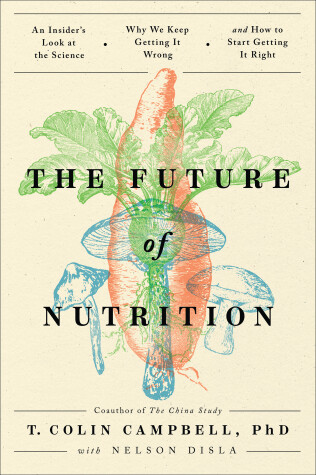Reviewed by annieb123 on
The Future of Nutrition is an expostulatory essay/survey of nutrition and health by Dr. T. Colin Campbell. Due out 15th Jan 2020 by BenBella Books, it's 350 pages and will be available in hardcover, audio, and ebook formats. It's worth noting that the ebook format has a handy interactive table of contents as well as interactive links. I've really become enamored of ebooks with interactive formats lately.
This is a well written and science based look at whole food plant based (WFPB) nutrition, through the lens of marketing, political movements, government intervention, and the formal academic science establishment. I would point out that the author makes no effort to be completely objective, he does build up a convincing argument, but the arguments he presents are in support of his original premises: namely that health is tied directly and inextricably to nutrition and that to enjoy good health, humans should largely depend on a plant based diet made up of whole (and mostly unprocessed) food as close to its natural state as possible.
The layout is logical and the language will be accessible to most readers. The introductory chapters build up the connection between disease and nutrition along with a capsule survey of the state of disease treatment today.
When I was a young person in secondary school (in the USA) I can remember vividly how quickly the established and accepted pyramid of food groups changed seemingly overnight from a very meat heavy recommended diet to more vegetables and fruits but even then, there was an emphasis on avoiding fats, oils, and refined sugars. The author spends a fair bit of content building up the connection throughout history of the influence of commercial interests on the recommendations which generations of consumers have followed. The changes which came and went rapidly led to confusion and resentment (what can we eat when *everything* is bad for us).
The last section includes the author's conclusions and a call to reflection where (for me personally) he veers off into an uncomfortable judgement of some parts of the formal medical establishment including a scathing rebuke of cytotoxic cancer treatment regimes (chemotherapy).
The author definitely "shows his work". I enjoyed poring over the notes and the exhaustive bibliography and full chapter notes and annotations (did I mention that this is an academic work?). The notes and references are likely worth the price of admission for anyone interested in the subject and there's obviously been a career spanning amount of time spent on research and resource gathering on the part of the author.
I found the entire book quite interesting and fascinating. It is, admittedly, a niche book and will appeal to readers interested in biology, nutrition, and the process of disease, but might not appeal to readers looking for an easy read. The language is rigorous and formal. I definitely don't think it's inaccessible for the average reader, but it will take some effort (and I think that's a good thing). This would make a good support text for classroom or library use, for nutrition and allied subjects, as well as a superlative read for the particularly bio-history-interested.
I do not necessarily agree with all of his conclusions in every detail, but I certainly agree with the basic premise that WFPB diets are good for us and for the planet (and not necessarily good for powerful mega-agro-businesses' bottom line).
Five stars. This is well and deeply researched and engaging.
Disclosure: I received an ARC at no cost from the author/publisher for review purposes.
Reading updates
- Started reading
- 14 December, 2020: Finished reading
- 14 December, 2020: Reviewed
